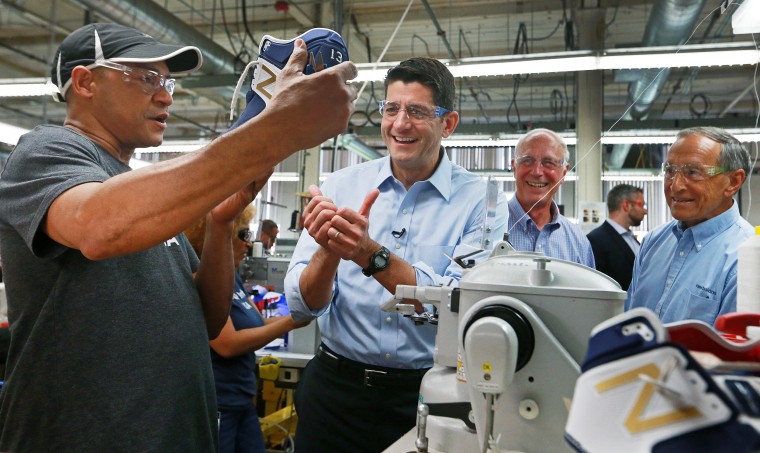Don’t believe the clickbait headlines and social media hysteria: The Republican tax plan isn't going to sink the American economy, and it's not going to supercharge growth.
These are, of course, only "problems" if you’re a hardcore GOP or Democratic partisan looking to jazz your voting base or entice donors. For the rest of us, a more prosaic reality is in store: very little is going to change — but it could, if policymakers bothered to think about the economic needs of a future America rather than the political needs of the present-day American electeds.
The reality is that, right now, the American economy doesn’t need “rocket fuel,” as President Trump called his tax plan. (Economists prefer the term “fiscal stimulus.”) It doesn’t remotely need a big debt-financed tax cut: The stock market is hitting records, and the unemployment rate is probably headed below 4% next year and into 2019, at least according to Goldman Sachs and a few other Wall Street firms. The rocket already has plenty of fuel, and is probably already moving at just about maximum speed.
Assuming that Congress nonetheless eventually passes and President Trump signs a bill that resembles the still-evolving Senate version, the economy might grow a tick faster annually over the next decade, according to government budgeteers and most private forecasters. Same with incomes, generally. For those mild positive effects, you can thank the big cut in corporate tax rates and the increase in the child tax credit, depending on how the final bill shakes out. Both are good ideas that actually have some support in both parties, albeit often sotto voce on the left.
But at the end of the tax-cutting day, we’re almost certainly talking about an economy not much different than today’s model. The federal debt burden will be similarly affected: It will be bigger than without the tax cut, but the overall upward trajectory of the deficit would be about the same. Interest rates won’t likely soar as a result; the dollar won’t collapse.
Here’s the problem, though: The American economy can definitely do better, and it needs to. It can grow faster, and it can be more dynamic, more competitive. The gains from economic growth can be more evenly distributed.
There are, to be fair, some parts of the GOP tax plan that would help (like that big reduction in the corporate tax rate). But overall, the centerpiece of the Trumpublican economic agenda is a missed opportunity, one that costs $1.5 trillion — if not much more — over the long-term.
The economy’s current steady progress should have instead given policymakers the opportunity to take a step back, think broadly about the challenges and problems facing 21st century America, and then try to assemble broad-based support for smart solutions and reforms.
But Republicans haven’t done that. Instead they played to the exact stereotype that President Obama once described this way: “Have a surplus? Try a tax cut. Deficit too high — try another. Feel a cold coming on? Take two tax cuts, roll back some regulations, and call us in the morning.”
The economy needs tax reform — Obama, after all, also proposed cutting corporate tax rates — although more to optimize the tax code for growth than to reduce the total tax burden or simply cut rates. The U.S. is, after all, a low-tax country by international standards, no matter what the president keeps insisting.
But the economy needs so much more than just tax cuts, especially in policy areas that Republicans have thought little about compared to cutting taxes.
For instance: A comprehensive new report from McKinsey, “Jobs Lost, Jobs Gained,” finds that advancing artificial intelligence and robotics may force one-third of the U.S. workforce to change occupational categories by 2030. If one accepts that insight, a natural next step probably wouldn’t be changing the tax code to encourage more investment in machines. Instead, we might want to think harder about investing more in carbon-based life forms, too.
According to McKinsey, a “Marshall Plan” for the American workforce is needed. Its key components would involve “scaling up workforce retraining and skill development programs, particularly for midcareer workers; improving labor market dynamism; and providing income and transition support to displaced workers.” Some savvy politician might want to steal the “putting people first” slogan from Bill Clinton’s 1992 president campaign for this agenda.
Another intriguing set of ideas come from wonks Brink Lindsey and Steven Teles, authors of the new book, “The Captured Economy: How the Powerful Enrich Themselves, Slow Down Growth, and Increase Inequality.” As they see it, the U.S. economy has become less competitive in recent years as the government favors wealthy families and incumbent businesses more and more. The result of that favoritism has been slower growth and higher inequality.
As a counter, Lindsey and Teles recommend looser intellectual property law to help spread ideas and technology, as well as less restrictive land-use regulations that could make it more feasible for workers to move to booming regions such as the Bay Area and other tech hubs.
Whether this tax bill passes or crashes, America will keep growing — and its biggest problems will keep persisting. Both parties might want to consider what they do the day after tomorrow.
James Pethokoukis is an economic policy analyst at the American Enterprise Institute. He is also an official CNBC contributor.

